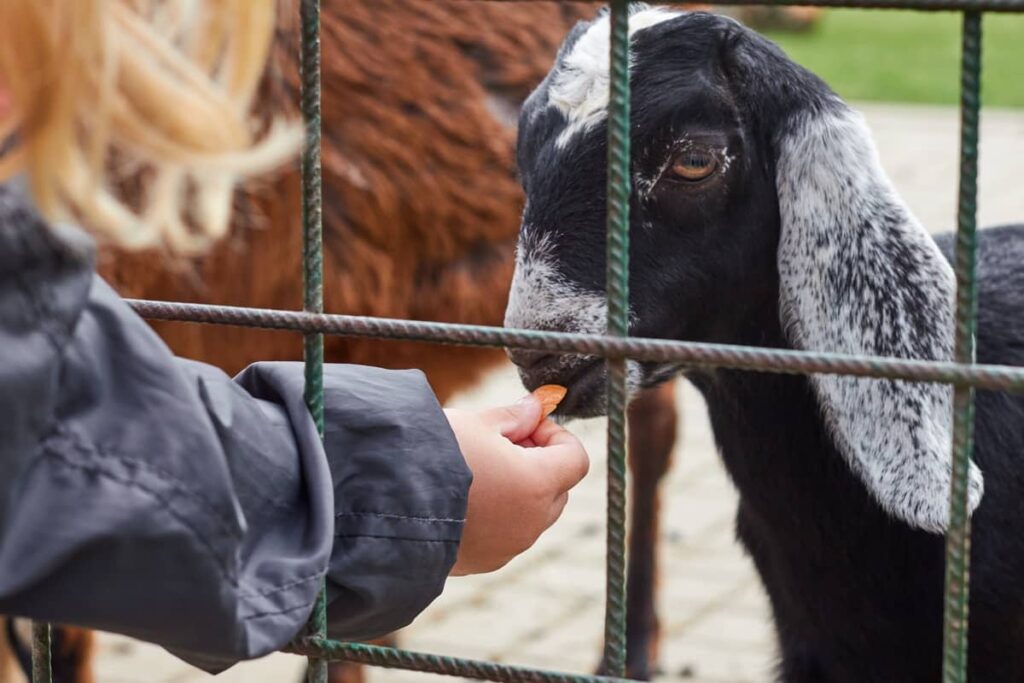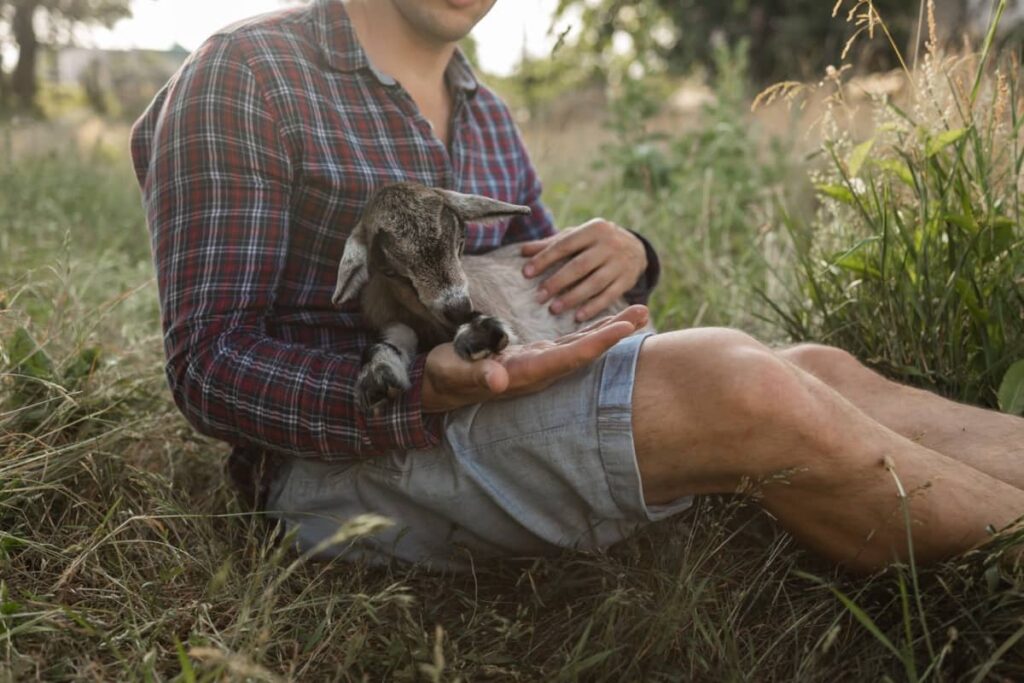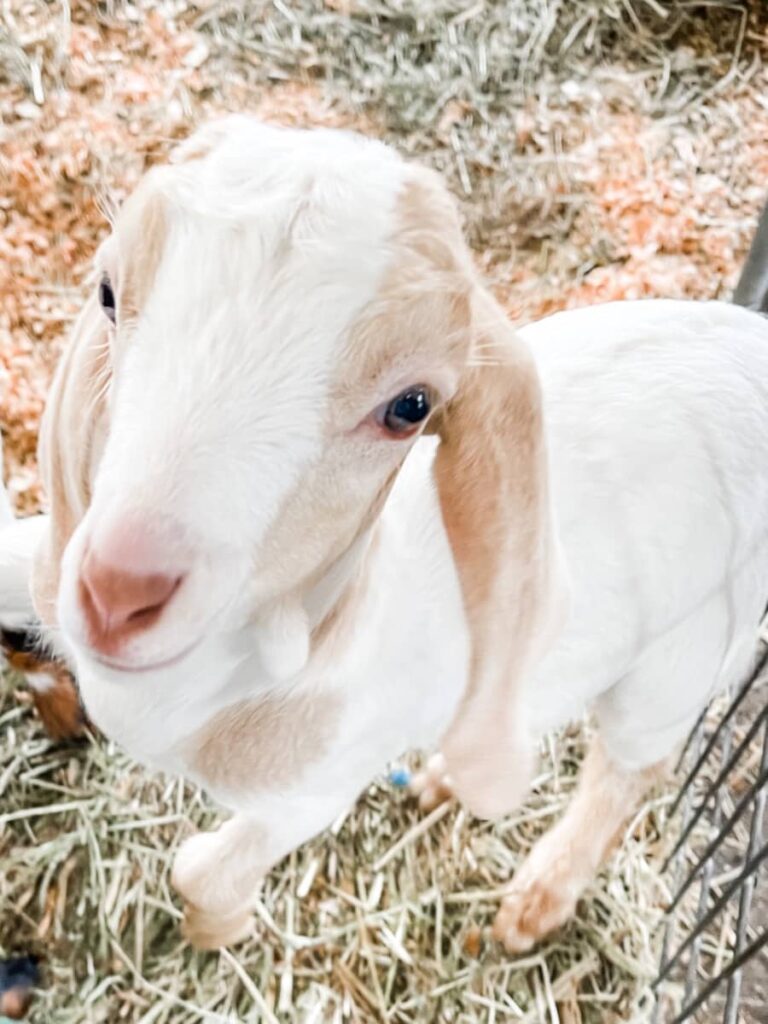Jamunapari goats, also known as Jumnapari goats, are a breed of domestic goats originating from the Indian state of Uttar Pradesh. Originally from India, these goats are bred for milk and meat production. Their distinctive appearance and impressive size are quickly gaining popularity in the market.

Choose a Location for Jamunapari Goat Farming
- The ideal location for raising these goats has access to clean water and fresh green pastures.
- The climate in your chosen location is also important, as Jamunapari goats require warm temperatures and cannot tolerate extreme cold. A place with moderate weather will be perfect for them.
- It’s also important to ensure that the land where you keep the goats is free from harmful chemicals or pollutants, such as pesticides or industrial waste, which could negatively affect their health.
- Choosing the right location for your Jamunapari goat farm requires careful consideration. Once you find your perfect spot with ideal resources and facilities, it’s time to build the housing structure required for these beautiful creatures.
Jamunapari Goat Appearance and Weight
- Jamunapari goats are known for their unique physical characteristics and traits that make them stand out from other goat breeds. These goats have a distinctively large body structure with long, slender legs and a deep chest. Their ears are also remarkable, long, droopy, and curved inwards towards the face.
- The Jamunapari goat is a large and majestic breed characterized by its long legs and elegant appearance.
- One interesting characteristic of this breed is its ability to adapt to different climates.
- The Jamunapari goat has many desirable characteristics that make it one of the most popular breeds among farmers worldwide.
- The Jamunapari goat is a large breed with an average weight of 40 kg for males and 30 kg for females. They are also popular among farmers because of their high milk yield.
Shed (Housing) Structure for Jamunapari Goat Farming
- The housing structure is an essential aspect that needs careful consideration. The shed should provide a comfortable and secure environment for your livestock while protecting them from harsh weather conditions.
- The ideal housing structure for Jamunapari goat farming should be spacious enough to allow the free movement of the animals. It is advisable to have at least 15 square feet of space per animal in the shed.
- The flooring should be made of concrete or any other non-slippery material that can be easily cleaned and disinfected regularly. Adequate drainage systems must also be installed to prevent water stagnation, which can lead to health complications for your goats.
What is the Purpose of the Jamunapari Goat?
- The Jamunapari Goat is a versatile breed that can be bred for milk and meat production. This breed is highly valued for its high-quality milk, which has a rich, creamy texture and contains higher protein levels and fat than other goat breeds.
- Apart from their milk production capabilities, the Jamunapari Goats are known for their fast growth rate and good meat quality. Their meat is leaner compared to other breeds, making it more nutritious. In addition, the Jamunapari Goat is sometimes used in crossbreeding programs with other popular goat breeds to improve certain traits such as productivity or disease resistance.
- The purpose of breeding Jamunapari Goats varies depending on individual preferences but most commonly revolves around profit generation through milk or meat production.
In case you missed it: Kalahari Red Goat Breed: A Comprehensive Information Guide

Health Care Tips for Jamunapari Goat Breed
- Caring for a Jamunapari goat is essential to ensure good health and productivity. As with all animals, regular veterinary check-ups are necessary. These check-ups can detect potential health problems early on and help prevent the spread of infectious diseases.
- Maintaining proper hygiene by cleaning the goats’ living area regularly, providing clean water and food, and keeping the animals free from pests like ticks, fleas, or lice is important.
- Vaccinations are another important aspect of goat healthcare that should not be overlooked. Vaccines help to protect against common illnesses such as pneumonia, tetanus, etc.
- Regular deworming helps control internal parasites, which can cause various health issues related to digestive system disorders leading to weight loss & reduced milk production.
- Providing an environment that is clean & hygienic while ensuring proper medical care, nutrition & vaccination schedule keeps your Jamunapari goats happy & healthy.
Steps to Start a Jamunapari Goat Farming
- Firstly, you need to select a suitable location for raising goats. Jamunapari goats are adaptable and hardy but require adequate grazing land and shelter from harsh weather conditions.
- Once you have found your ideal location, it’s time to set up your goat farm with proper housing structures that provide enough space for the herd to move around comfortably. You’ll also need to create a feeding and watering schedule based on their nutritional needs.
- Ensure that they are fed high-quality food and clean water regularly. Don’t forget to consult with local experts or veterinarians who can help guide you throughout your journey as a goat farmer.
- When selecting your breeding stock, look for healthy animals with good genetics to ensure high-quality milk production and strong offspring. Regular health check-ups are essential; ensure your goats receive routine vaccinations and deworming treatments.
- Marketing your products is crucial in any business venture; consider selling milk or meat products at local markets or online platforms.
Feeding Tips for Jamunapari Goats
- Feeding Jamunapari goats is a crucial aspect of goat farming. A well-balanced diet ensures good health and productivity in the long run. The feeding type selection depends on various factors such as the purpose of rearing, age, weight, and climate.
- For dairy purposes, concentrate feed with high protein levels should be given to meet their nutritional requirements. In addition, green forage like alfalfa or clover hay can also be given.
- Special attention must be paid to their diet during pregnancy and lactation as they require extra nutrients for milk production and fetal growth. At this stage, mineral supplements containing calcium and phosphorus are essential for maintaining their bodily functions.
- Watering plays an equally important role in keeping Jamunapari goats healthy. Clean water should always be available to them throughout the day in sufficient quantities.
- Providing optimal nutrition through proper feeding practices enhances productivity levels leading to better profits making it an essential element for any successful Jamunapari goat farming business venture.
In case you missed it: Exploring the Art of Goat Farming in Kashmir Valley

Conclusion
These beautiful creatures are bred for both milk and meat production. These goats are usually kept by farmers who want to maximize profits through milk and meat sales. The demand for these products in the market makes rearing this breed lucrative as they offer high yields.
- Goat Milking Practices and Equipment: A Beginner’s Guide
- Goat Farming for Fiber: Producing Mohair and Cashmere
- Maximizing Goat Milk Production: Tips for Dairy Goat Farmers
- Goat Farming as a Family Business: Strategies for Success
- Profitable Kenya Goat Breeds for Commercial Dairy and Meat Business
- Unlock the Secrets of Oberhasli Goat: Discover Raising and Management Practices
- Ultimate Guide to Myotonic Goats: Explore Profile to Raising
- Unlock the Secrets of Rove Goat: Discover Management Practices
- Ultimate Guide to Malwa Goat: Explore from Origin to Management Practices